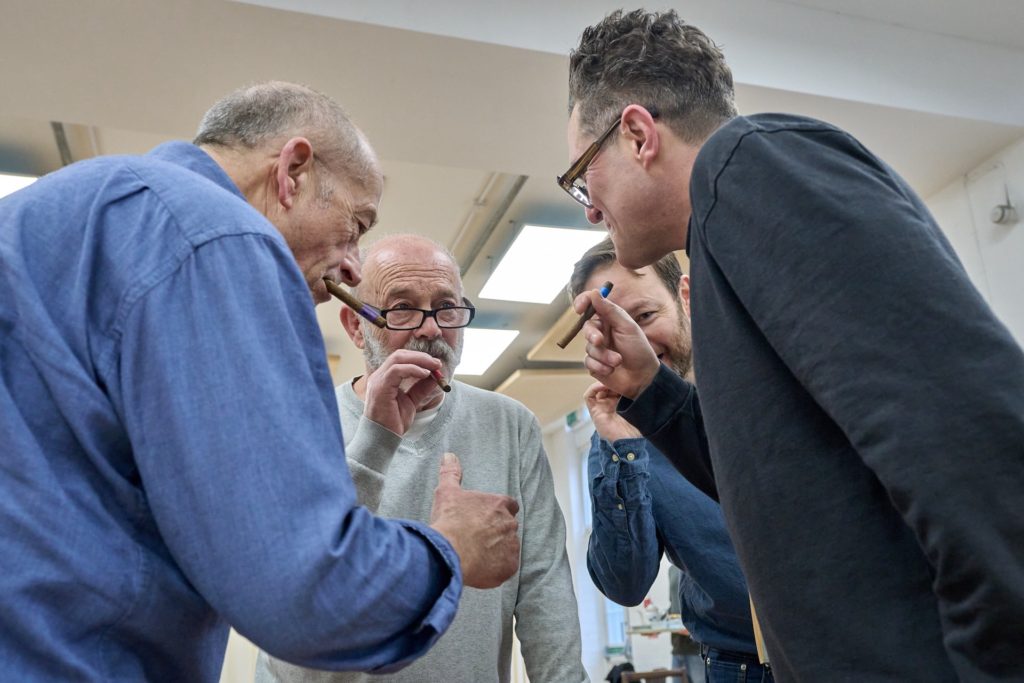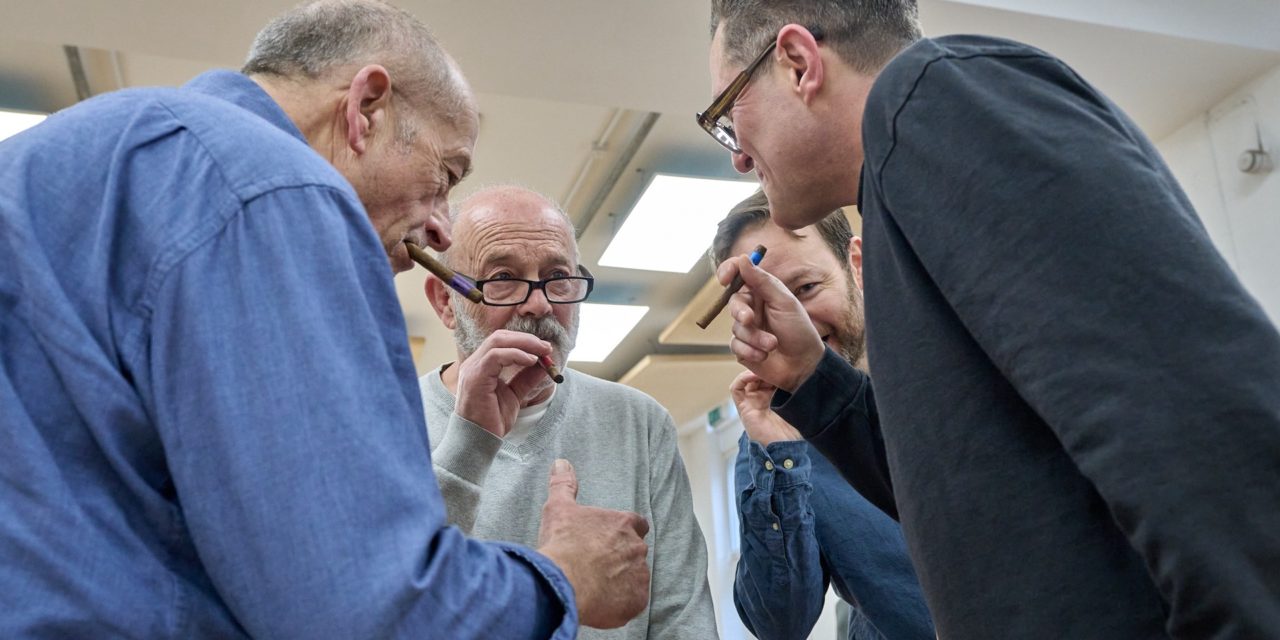
THE HOMECOMING – Theatre Royal Bath – 30th March to 9th April 2022
A new production of Harold Pinter’s Tony Award-winning drama The Homecoming starring Mathew Horne, Keith Allen and Ian Bartholomew, directed by Jamie Glover, opens at the Theatre Royal Bath appearing from Wednesday 30th March to Saturday 9th April prior to a UK tour.
Here Mathew Horne (Gavin & Stacey, Agatha Raisin, Bad Education) who stars as Lenny and Keith Allen (The Pembrokeshire Murders, Marcella, Robin Hood) who stars as Max, talk about their roles in the play which is widely regarded as Pinter’s finest work.
For people who are new to The Homecoming, what is it about and who do you play?
Mathew: The play is about the return of Teddy and his new wife to the family home, where his two brothers and his elderly father Max still live in North London in 1965. It explores the power struggle that ensues between all the men there and the new female in the house. I play Lenny, who is the middle son.
Keith: Max is the patriarch of a very misogynistic household. Every character is repressed to the nth degree but while most of them repress their rage Max doesn’t. He had a very interesting relationship with his now-dead wife that has coloured his whole life and he’s in a household where they’re all playing games and trying to top each other. Everything that’s done is for a reason and it’s usually to get one over on someone else.
How would you sum up your respective characters?
Keith: I would describe Max as a raging sheep. If you’ve ever been in a field with a very angry tup you don’t want to be there. I’ve been there and they don’t back down.
Mathew: Lenny is a pimp and he’s a bit of a chip off the old block in terms of his father. He’s a working class boy with aspirations above his station and on the surface he appears to be a charming and amiable man but there’s a deep-seated resentment and menace about him.
Keith, this isn’t your first time performing in The Homecoming, is it?
Keith: No, it isn’t. I played Teddy at the National in 1997 and then I played Uncle Sam at the Trafalgar Studios in 2015. Now I’m playing Max but that’s as far as I can go because I’m too old to play Joey or Lenny.
Mathew, what was it about the play that hooked you in?
Mathew: There are two reasons really. I sort of helped put this production together with the director Jamie Glover, who is a friend and colleague of just over five years. We explored the possibility of doing a number of plays and eventually landed on The Homecoming because it was offered to us by Harold Pinter’s estate. Then Lenny is a character that I always wanted to play so it felt like a no-brainer. It’s the danger and menace that’s innate in him which attracted me to this character because it’s not something I’m generally allowed to play on television or in films.
Does that frustrate you?
Mathew: I’m used to it now. It’s just the way that section of the industry works. It’s much less open to taking risks but it doesn’t frustrate me because I have this wonderful other form within the industry, namely theatre, which doesn’t place those restrictions on me. I’m incredibly grateful for the opportunities I’ve had in the theatre to play very different roles to those I’d usually be offered or might secure through audition on screen. On screen you can be pigeonholed quite easily whereas in the theatre it’s a bit more open in terms of the opportunities that are presented to an actor, certainly in my case. A character with real danger and menace is something I can’t recall having done, so that’s every reason to play him.
Keith, have you had the same experience of being typecast on screen?
Keith: [Laughs] No because I’ve not been in enough TV to be typecast. I was the Sheriff of Nottingham so I don’t know how you’d typecast me in that, then there was Bodies where I was nothing like the Sheriff. But I don’t think I often play many mild-mannered, sympathetic men and of course The Homecoming is a very black comedy.
The play is now widely regarded as Pinter’s finest work. Why do you think that is?
Keith: I’ve always thought Pinter was a poet before he was a playwright and the poetry in it is amazing. This whole play is about language and very particular choices of words, which is why as an actor you have to be very on-the-ball about the grammar. I think the lyricism of the play is extraordinarily attractive and the tension in it has people constantly going ‘What on earth is happening and what’s going to happen next?’
Mathew: It’s because it is his best play, simple as that. It’s poetic and it’s like a piece of classical music. It’s an immaculate work in terms of the writing and there’s no fat on the meat in this play. It’s deft.
What would you say are the salient themes of the piece?
Mathew: The exploration of masculinity, male toxicity and the patriarchy is very much bubbling away throughout and that feels particularly relevant now with war happening in Europe and with the ultimate despotic patriarch at the helm. It’s an exploration of a man’s world and the intricacies and complexities of men’s struggle for power and oneupmanship.
Keith: Misogyny is very present in the play, as is generational jealousy within a family. The mother is dead but she looms very large in everyone’s memory, especially Max’s because he loathed her. When the play was first performed I don’t think anyone had seen anything quite so vicious and measured before. Now it’s interesting for different reasons because we’re living in a time where women are becoming far more recognised and are on a far more equal footing. There are things in the play that could be misconstrued as being abusive to women and, because of the times we’re living in, audiences might react very quickly to certain things which they wouldn’t necessarily have reacted to before.
Have you worked together before?
Mathew: Yes twice before on television but never in the theatre or doing this much together. The two characters have a lot of interaction, whereas the stuff I’ve done with Keith on television was quite bitty. It’s great to be working with him so closely in a different medium.
Have you worked at the Theatre Royal Bath before?
Keith: No, never. I went to see Alfie in his first ever play there, which was Equus, and it was wonderful. It’s a beautiful theatre that attracts true theatregoing people. [Laughs] Let’s hope so, anyway.
Mathew: I think I’ve played Bath with every play I’ve done, so this will be my fourth or fifth time. The audiences are fantastic and they always come along in very healthy numbers. The Theatre Royal is known for being full of theatre aficionados so it’s quite high-pressure but it’s a great place to work and a lovely city.
When were you last on tour and what do you most enjoy about it?
Mathew: That would have been three and a half years ago in the stage adaptation of Rain Man. That was a fantastic experience. If you do a long run in the West End it can get a little repetitive so it’s nice to keep a show on the move around the country. I think it’s really important that theatre isn’t just a London-centric industry. Taking plays outside of London is fascinating because audiences do change and spaces change, therefore the play takes on different forms.
Keith: I really like touring. I like the fact that you’re on the move and it’s as if you’re having an opening night every week because you’re in a different space, in a different theatre, with a different ambiance. I like to fit in some golf wherever I go and I have an ingrained curiosity about corrugated iron chapels and buildings so I always see if I can find one of two to go and have a look at.
Mathew, how do you like to spend your downtime between shows?
Mathew: It’s funny because we always say ‘The great thing about theatre is that you’ve got your days free’ but it doesn’t really work like that. You’re thinking about the evening show the moment you wake up. I will explore whatever city or town we’re in, go for a run, see the sights in places I don’t already know and visit old haunts in the places I do know but you’ve always got the evening show looming over you.
The Homecoming appears at the Theatre Royal Bath from Wednesday 30th March to Saturday 9th April. Tickets are on sale at the Theatre Royal Bath Box Office on 01225 448844 and online at www.theatreroyal.org.uk
Photo credit: Manuel Harlan


